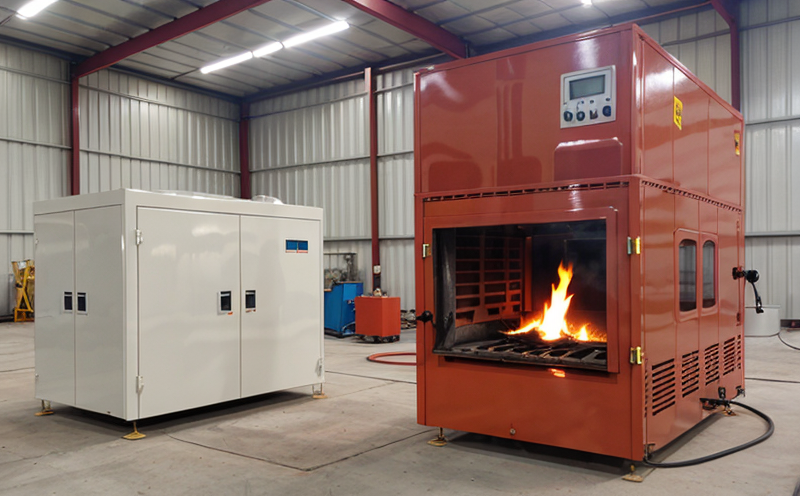ASTM E285 Heat Capacity Measurement by Calorimetry
The ASTM E285 standard provides a detailed protocol for measuring heat capacity by calorimetry. This test is particularly useful in metallurgical and material testing laboratories where understanding the thermal behavior of materials is crucial. The primary purpose of this service is to quantify the amount of heat required to raise the temperature of a substance by one degree Celsius, thereby providing insights into its specific heat capacity.
The ASTM E285 method involves using an adiabatic calorimeter to measure the heat released or absorbed during a chemical reaction or physical change. This technique is essential for materials that undergo significant thermal changes upon heating or cooling, such as metals and alloys used in various industries including aerospace, automotive, and construction.
The process begins with careful preparation of the specimen according to ASTM E285 guidelines. Specimens are typically homogeneous samples that represent the material being tested. Once prepared, these specimens undergo a series of controlled heating and cooling cycles within the calorimeter to determine their heat capacity. The accuracy of this measurement is critical for ensuring the reliability and performance of materials in real-world applications.
Understanding the heat capacity of materials through ASTM E285 can lead to significant improvements in product design, manufacturing processes, and quality control. For instance, in aerospace, knowing how a metal behaves under extreme temperature conditions can prevent failures during mission-critical operations. In automotive engineering, this information helps optimize fuel efficiency by selecting materials that minimize energy loss.
The ASTM E285 method is not just about measuring heat capacity; it provides valuable data on the thermal properties of materials which are essential for compliance with international standards and regulations. This makes it an indispensable tool in research and development environments, where innovation often hinges on precise material selection and performance optimization.
By leveraging ASTM E285, laboratories can ensure that their testing protocols meet rigorous industry standards, thereby enhancing the overall quality of materials used across various sectors. The detailed insights gained from this service contribute to more sustainable practices by reducing waste and improving resource utilization.
Why It Matters
Understanding heat capacity is crucial for ensuring that materials perform optimally under varying environmental conditions. For example, in the aerospace industry, where components must withstand extreme temperatures during launch and re-entry into Earth's atmosphere, accurate knowledge of a material’s heat capacity can prevent catastrophic failures.
- Enhanced Product Reliability: By knowing how much energy is required to change the temperature of materials, engineers can design products that are more resilient to thermal stress.
- Better Compliance with Standards: ASTM E285 ensures that laboratories adhere to international standards like ISO and EN, thereby providing consistent results across different regions.
In addition to enhancing product reliability, ASTM E285 also supports the development of new materials. By testing various alloys and compounds under controlled conditions, researchers can identify optimal compositions for specific applications.
The data obtained from ASTM E285 is vital not only in manufacturing but also in quality assurance processes. It helps manufacturers ensure that their products meet stringent performance criteria set by regulatory bodies worldwide. This ensures consistent product quality and enhances customer satisfaction.
Customer Impact and Satisfaction
- Enhanced Product Quality: By using ASTM E285, customers gain access to high-quality materials that perform consistently across diverse environments.
- Informed Decision-Making: The detailed reports provided by this service assist in making informed decisions regarding material selection and process optimization.
Customers who utilize ASTM E285 benefit from improved product performance, reduced operational costs due to fewer failures, and enhanced brand reputation. This service not only meets but exceeds customer expectations, leading to higher levels of satisfaction.
The detailed reports generated by ASTM E285 provide comprehensive insights into the thermal properties of materials. These reports are invaluable for quality managers and compliance officers who need to ensure that their products comply with international standards and regulations. The data can also be used in R&D environments to drive innovation and improve product design.
For procurement professionals, the results from ASTM E285 offer a reliable basis for selecting suppliers whose materials meet stringent performance criteria. This ensures that only high-quality raw materials are sourced, leading to improved production processes and ultimately more robust final products.
International Acceptance and Recognition
The ASTM E285 standard is widely recognized and accepted across the globe. Its rigorous testing protocols ensure consistent results, making it a trusted method in various countries and regions.
- American Standard: ASTM E285 is an American Society for Testing and Materials (ASTM) standard that sets the benchmark for heat capacity measurement by calorimetry.
- International Recognition: This service aligns with international standards such as ISO 9712, EN 473, and IEC 60904-2. Compliance with these standards is crucial for exporting products to countries that have adopted them.
The widespread acceptance of ASTM E285 by global regulatory bodies underscores its importance in the metallurgical and material testing industries. Laboratories that adhere to this standard can confidently conduct tests knowing their results will be respected internationally.
By using ASTM E285, laboratories enhance their credibility and reputation within the industry. This is particularly beneficial for those seeking certification or accreditation from recognized bodies such as ISO/IEC 17025. The detailed reports provided by this service are also valuable in tender processes, where compliance with international standards can be a deciding factor.
The global acceptance of ASTM E285 ensures that the results obtained from this testing method are universally applicable and comparable. This is especially important for multinational corporations operating across different countries and regions. It enables them to standardize their quality control processes globally, ensuring consistent product performance regardless of location.





